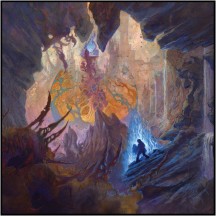Caelestra - Bastion review
| Band: | Caelestra |
| Album: | Bastion |
| Style: | Post-metal, Progressive metal |
| Release date: | December 13, 2024 |
| A review by: | musclassia |
01. Halcyon
02. Soteria
03. Finisterre
04. Lightbringer
05. The Hollow Altar
06. Eos
In the dying embers of 2024, there’s just enough time to fit in one more review of a great extreme prog metal album.
The album in question is Bastion, the second album from the Bristolian one-man project Caelestra, masterminded by Frank Harper. The album was inspired by Harper’s wife’s ongoing struggles with cystic fibrosis and Harper’s own experiences of dealing with the diagnosis, but while there is sadness in the album, Harper also sought to capture the feelings of taking stock in the good experiences in life, and this is firmly reflected in the bright euphoric soundscapes crafted across Bastion.
Probably the easiest catch-all label for the album is ‘progressive black metal’, but ‘bright’ and ‘euphoric’ are adjectives quite often used in reference to post-rock and blackgaze, and while Bastion isn’t a blackgaze record, some of the warmth imbued into the record’s textures and layers does bear some degree of similarity with acts such as Heretoir, Kardashev or Mesarthim. This comes through on the 3-minute opener “Halcyon”, which opens in very understated ambient fashion, but takes a turn midway through to unleash a glowing metallic soundscape accentuated with delicate post-rock tremolo textures. The vocals utilized on “Halcyon” include a very high-pitched semi-harsh/semi-clean style that (particularly in combination with warm textures) may well take listeners’ minds to Devin Townsend, as well as effects-laden cleaner singing.
The purely clean vocals on the record, much like on Exuvial’s recently released debut, are typically processed through some kind of almost robotic effect, and like with Exuvial, I find myself inclined to draw comparisons to Between The Buried And Me, and particularly their Parallax-Coma Ecliptic-Automata material. Specifically, I’m referring to their calmer, more sci-fi songs, as Bastion, while containing a good number of blast beats and blackened textures, is not an overly technical or frantic release.
That being said, despite all this talk of brightness and melody, there is extremity in the record, and each of the longer songs demonstrates it. “Soteria” contrasts grim chugs and rolling double bass with bright atmospheric synth layers, and melodic soundscapes with fierce blasting and the sharp high-pitched Devin-style vocals. There’s a real grandeur to the music, particularly in a passage later on when Caelestra switches to a really nifty guitar arpeggio motif when coming out of a softer acoustic sequence. Another emphatic motif comes right at the beginning of “Finisterre”; sometimes the two ends of the musical spectrum can come towards each other rather than being remarkable contrasts, and the technical melodeath/meloblack riff opening this song straddles the line between melody and aggression adeptly, reminding me somewhat of An Abstract Illusion.
After that triumphant, rampant opening, the song does calm down, and synths continue to make their mark. Keyboards and synths perform a major role in shaping the vibe of Bastion, whether it be the warbling sci-fi synths in the midsection of “Finisterre” that lend a quite celestial feel to the music, or the ambient sheen leant to “Lightbringer” in its opening stages, the steady nature of which reminds me somewhat of a mix between latter-day Enslaved and Heretoir.
“Lightbringer” is a song that does grapple with what is arguably the most notable weakness to Bastion, which is some of the sameness that can come over listeners when navigating the album as a whole; while the general style is very pleasing, some passages struggle a bit to rise beyond the baseline and become noteworthy in their own right. “Lightbringer” and closer “Eos” both grapple with this issue at times, but each of them does have a dramatic climactic moment that elevates the respective songs when the synths, vocals, guitars and drums synergize with one another.
A song that doesn’t suffer much from this problem is “The Hollow Altar”, likely the standout cut from Bastion. The ceremonial chimes and harmonized group vocals already lend a distinctive flavour to its opening moments, but the subsequent traversal of subtle dissonance, lush BTBAM-influenced synth sequences, memorable clean vocal choruses imbued with a remarkable balance of gloom and grandeur, and grandstand releases of ominous mid-tempo chugs or majestic bursts of extremity, altogether result in a delightfully multi-faceted and engrossing experience.
The manner in which “The Hollow Altar”, and to a lesser extent “Finisterre”, stand out against the remaining songs does indicate that there is still room for Caelestra to grow and refine, but even with that in mind, Bastion is a strong demonstration of the current iteration of Harper’s project. I hope any further releases to come from Caelestra can be made under happier circumstances for the Harpers, and I embrace what he has accomplished in the current situation with Bastion.
Rating breakdown
| Performance: | 8 |
| Songwriting: | 8 |
| Originality: | 8 |
| Production: | 8 |
Hits total: 1102 | This month: 871





